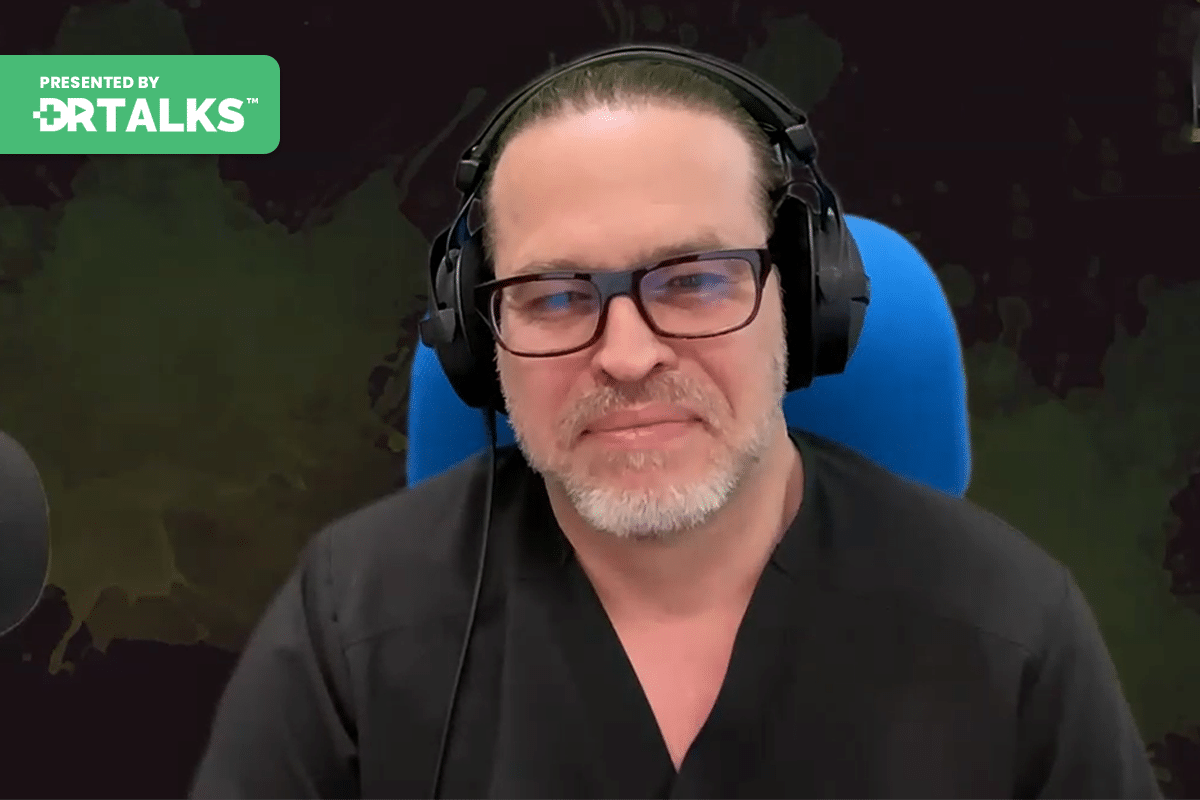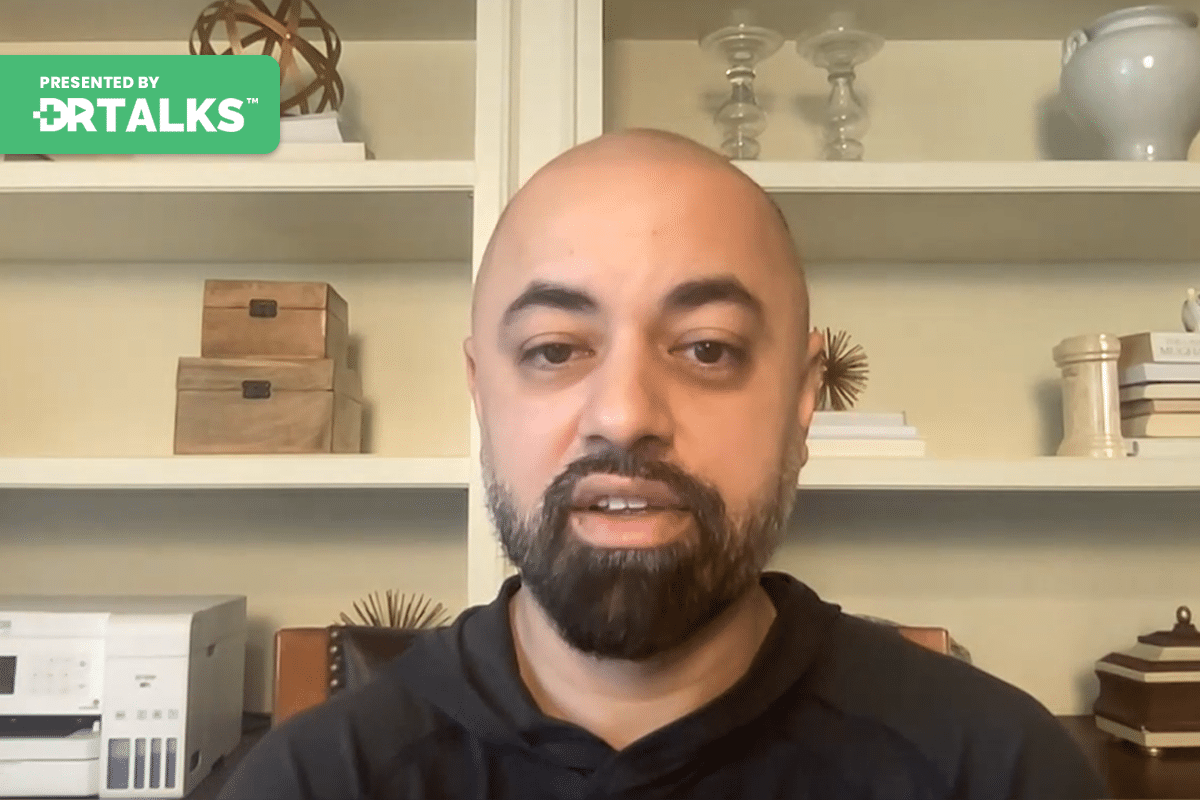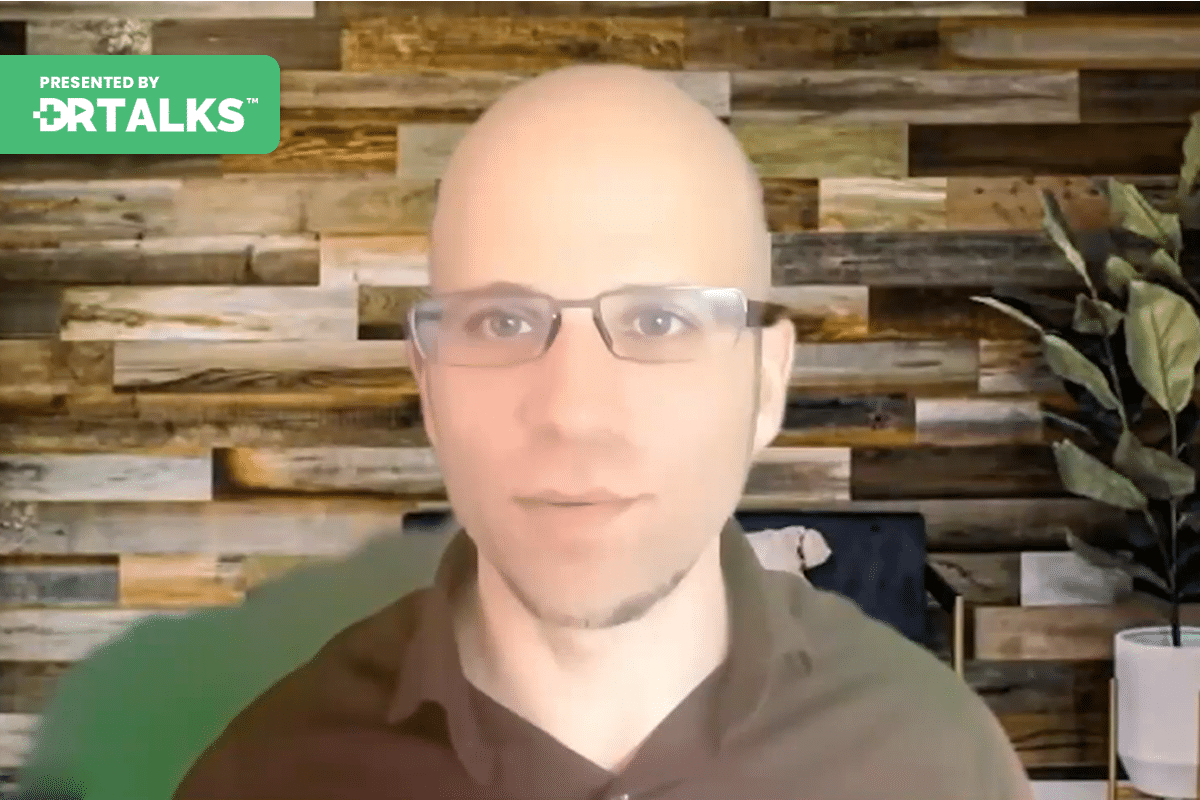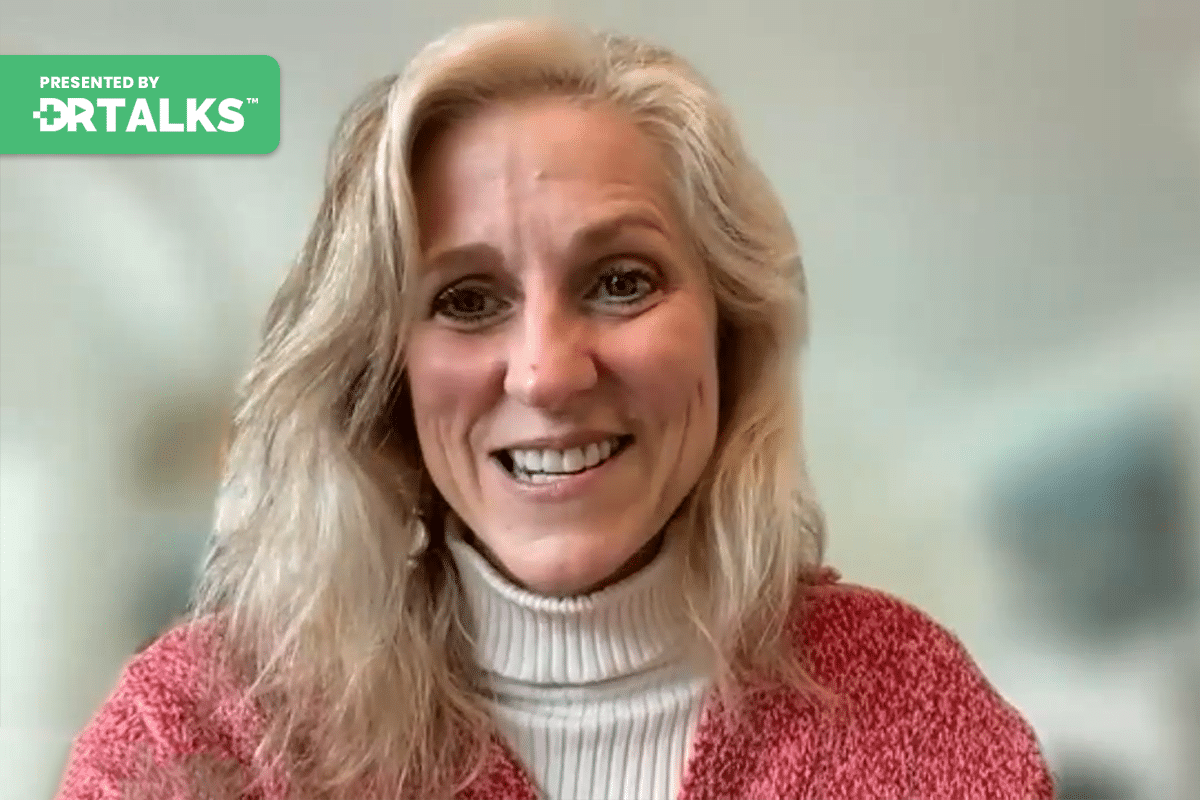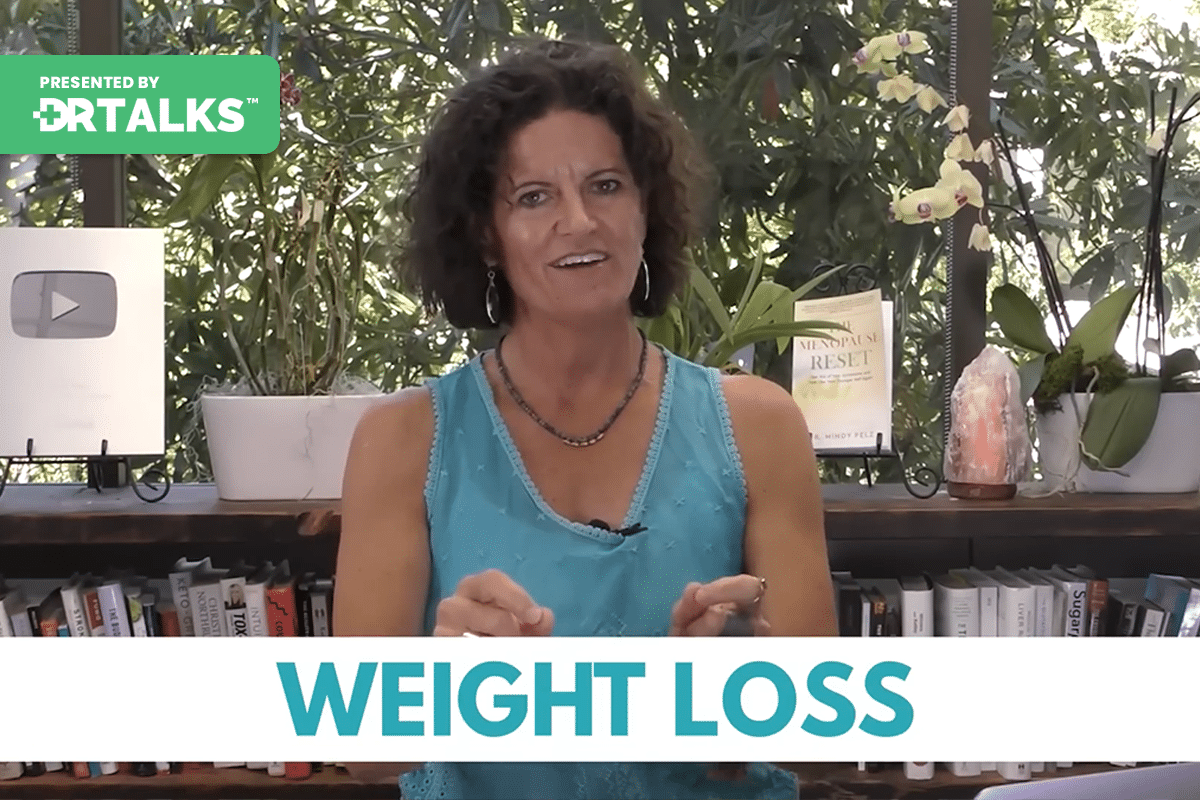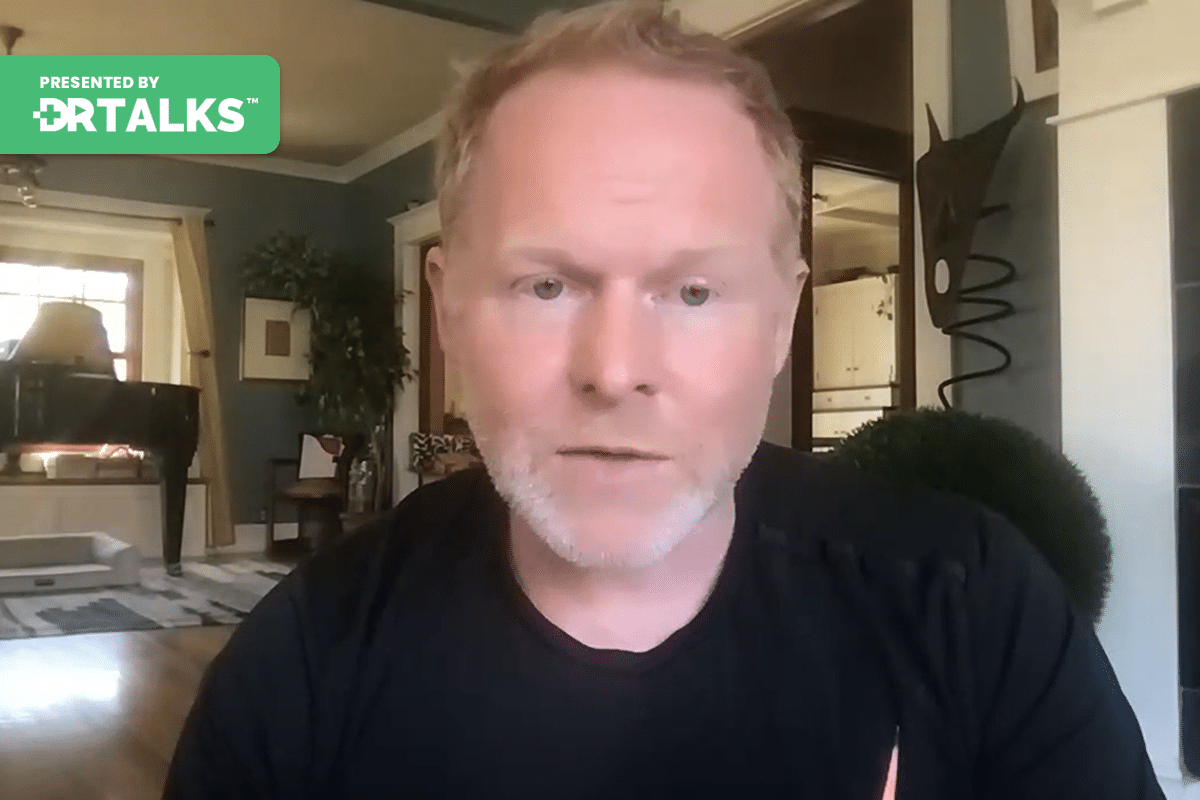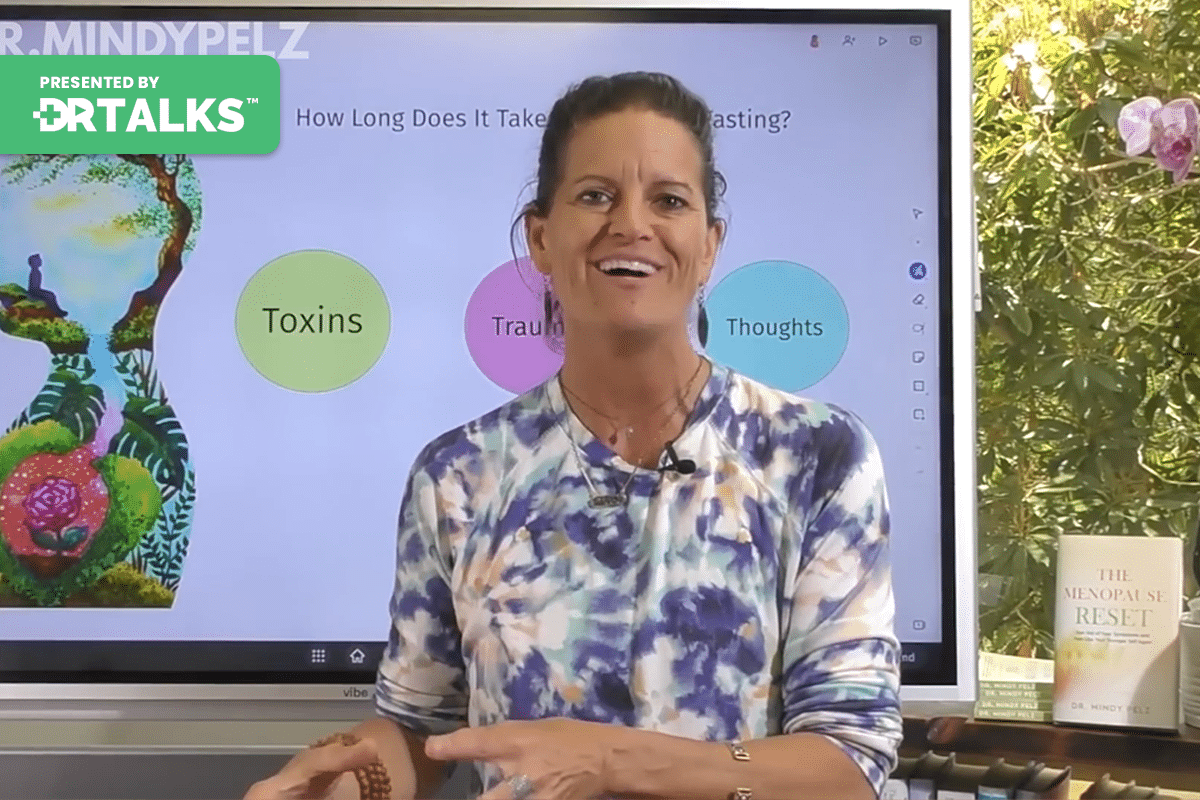Join the discussion below

Kashif Khan is the Chief Executive Officer and Founder of The DNA Company, where personalized medicine is being pioneered through unique insights into the human genome. With the largest study of its kind globally, The DNA Company has developed a functional approach to genomic interpretation overlaying environment, nutrition, and lifestyle... Read More
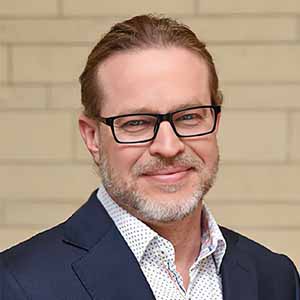
Dr. Whitfield is an experienced, Board Certified Plastic Surgeon. He completed six years of surgical training at Indiana University Medical Center. He remained at the Indiana University Medical Center to complete his Plastic Surgery Residency. At the completion of his Plastic Surgery Residency he chose to gain additional training in... Read More
- Understand your genetic susceptibility to Breast Implant Illness
- Dive into the latest research about this health concern
- Discover proven strategies to heal and thrive after BII
Kashif Khan
Welcome back, everybody. Okay. We have an awesome perspective for you on an important topic today, because why do I say that, that this what we’ve been hearing about breast implant illness, this gray area that has been disputed to the point where some clinicians will even say this is not a thing to speak of. It doesn’t exist. It’s a gray area where some women will say this is the number one thing that drove their poor health outcome. And there’s this major gap in between. And we haven’t had the right clinical perspective. Then comes along Dr. Robert Whitfield, who used to help women get implants and, you know, do whatever they needed cosmetically and started to service some of the complaints. And he has now, after many hundreds of excellence, helping women remove them, done deep clinical research on the subject. And we finally have that purview, that visibility from the clinical perspective that we’ve been waiting for. So thank you for joining us here.
Robert Whitfield, MD
Thank you for having me.
Kashif Khan
Oh, it’s amazing, man. I can’t think of anyone better to talk on the topic because we have spoken to various, let’s say, coaches, even women that feel they’ve been victimized by it, you know, that kind of perspective. But to actually be in the lab and you’re actually running testing on these things and studying the microbial activity and all that kind of stuff. So that’s really awesome to be able to sort of peek under the hood and know that going on. So let’s just go to the very beginning. This is still new to some people, right?
Robert Whitfield, MD
Right.
Kashif Khan
So what is that? What is breast implant like? Is it real? Is this a real thing that’s happening? Is that even the right term? We should be using breast implant illness. What is it?
Robert Whitfield, MD
Right. So I think some of the consternation in the medical community is breast implant illness. It’s not a medical diagnosis because it’s international classification of disease. Does it recognize that as a diagnosis? So, you know, for the listeners, the ICD ten, which is the the codes used to describe a illness, this doesn’t exist in that coding system. So for me, when I speak to other physicians, other patients in consultation to me breast implant illness is chronic inflammation. And, and the issue when someone comes to me now and I’ve been fortunate to learn from yourself and your company through genetic testing, their genetic profiles, I already had a very, very strong, you know, pattern of characterization for them when I saw them in person. Mm hmm. But now when I hear someone speak to me, either through consultation, even on a phone call, actually, and then when I have them in front of me, chronic inflammation affects every system of the body. When I see a breast implant illness patient and so if if they come to me and they have these symptoms of brain fog, light and sound, sensitivity, headache problems with their ear, nose and throat dry mouth, dry eyes, problems with swallowing, difficulty swallowing, shortness of breath that affects their respiratory system.
They may have chest pain, chest tightness, and then all just the myriad of gut problems they can have swelling and bloating, constipation, diarrhea and then systemically in their musculoskeletal system, if you will think of it that way, they’ll have muscle pain, joint pain. They may have neuropathic pain in their feet, their hands or extremities in general. Anxiety, depression, I mean, every system is affected when you talk to them. So to me, the endgame is just chronic inflammation. Just look it up. I mean, it’s even on Wikipedia for goodness shaking. Chronic inflammation, right? So why do they have all this? And so I feel like a breast implant is just one driver of chronic inflammation, albeit in any given woman. It can be extremely, you know, complicated as a driver of inflammation. And I’ve had people come to me who’ve had every test know done. They’ve seen every consultant, every specialist. They’ve gone to look different. You know, I’m not going to give anybody any more prominent name than they need, but any clinic around the world, in fact, to try to figure this out. And nobody has an answer for them. But, you know, in our clinic and my personal experience, I’ve done over 1500 plants now and I have PCR testing on over a thousand at this point, and about 35% have a biofilm. So for the listeners, a biofilm is readily produced by certain bacteria.
And the one that I find most commonly on the surfaces in these scar capsules is Q-Tip. Back to your blackness. It’s found in a very high concentration on our facial skin, our chest skin, our shoulders. And so the biofilm is produced by this bacteria, and it makes it hard for your body to then eradicate it because it has this film, which is like a like a sugar coat, if you want to think of it simply. And your cells, your T cells or B cells, your inflammatory cells that are secreted when there’s inflammation and can’t get rid of this. So it’s just chronically being activated over time because this implants in place that may have this biofilm, but your body can’t get rid of it. So I liken it to the hamster in the wheel. It never stops, just continues to go. And at a certain point, genetically, we can only handle so much, you know, toxic burden. And just as we know, all of our environments are getting worse, not better with time. So as that burden grows, but your ability to tolerate it only says you can’t do it anymore. And then those symptoms really take hold and they become more and more part of, you know, the frequency increases to the point where I have people come in and they can’t get out of bed. You know, it took everything they could to get out of bed to come see me that day. I have people taking basically, you know, stimulants so they can go to work and maintain a job or take care of their kids or just try to function. It’s a really sad situation based on, you know, what I see? And, you know, the level of exposures I think are very broad. You had an exposure with environmental toxicity and I see a lot of people with environmental toxic exposures. So things like phthalates, which are in plastics that are plasticizers, food, you know, by phosphates are herbicides.
The pesticides that are affect, you know, the food we eat, especially in North America, it’s very, very prominent. I’ve had people have triclosan, which is an antibacterial that’s found in like wet wipes. And so women who are trying to do the right thing and use organic wipes sometimes this is antibiotic antibacterial found these wipes that they easily and readily absorb in their skin, which is a, as you would imagine, endocrine disruptors. So all of these things including, you know, mycotoxins from mold. Mold is very prominent in Texas, where I am, and in Florida and in California and in Hawaii and anywhere, you know, for that matter, on the coast or just in general, where there’s a lot of lack of humidity or or anywhere, you know, I people travel just for vacation in Mexico and they’ll stay on the coast and they’ll come back and feel terrible. And I recently had a case of this and I was like, if you just listen to that, they will tell you exactly what happened. If you just can listen, like close your eyes and listen, and they’ll be like, Well, I went to this patient I’m talking about, went to Cancun, and they with the family just, you know, for a vacation was like, okay, that it smell bad.
And the place where you went in the resort. Yeah. And they’ll be like, yeah that. I said, did you see anything? No, I didn’t see anything. But it definitely smell the certain sort of way and or you got to they had a consult with the patient who, you know, went to school. And in school, you know, in college, the station I’m talking about was in college, they lived in a group setting. And similarly, you know, they didn’t see the mold, but they could smell it. It was it had that. And I was like, well, that’s really bad. If you can smell stuff, that’s if it smells like mildew. I mean, I mean, that’s a done deal. So I feel like it’s a complicated situation and it’s hard for people to understand. But, you know, I’ve done over 3000 consults for this at this point. The pattern recognition, which is what physicians commonly used to, then, you know, produce, you know, more of an algorithm approach to what they’re what they’re seeing and then give you a treatment plan. I think it’s hard for them. To me it’s become quite common and I just feel like the amount of inflammation that I see in these patients is shocking at times.
Kashif Khan
Yeah, it’s so the way you describe it. If you talk to any subject matter experts on any chronic condition, you’re going to hear a very similar story where there’s the underlying insult, the implant, the mold, you know, could be something to do with the birth control pill causing hormone disruption, whatever. And then there’s everything else encapsulating that, your environment, nutrition, etc., because they’re the total load is so far beyond what we can handle. Right. And that thing, the thing that, for example, you specialize in over 3000 consults for this one particular topic. So you learned exactly how that becomes a catalyst for everything else, right? That’s the one. That’s the 50%. But the other 50% is everything else. So reduce one of these loads and you’re better. So you overarching sort of narrative in every major problem you see is chronic inflammation is being driven by everything that we’re exposed to in eating and smelling and putting on our skin. And there’s that one thing, that one thing you did that took you over the edge right in the implant could be that one thing. And it’s a very significant catalyst. It’s not just like a little incremental thing.
Robert Whitfield, MD
And when people ask me, you know, like, first of all, all for listeners, my whole background’s in oncology or construction, so I’ve had to take care of every single surgeon’s problems: neurosurgeons, orthopedic surgeons, ob gyn, oncology surgeons, cardiac surgeons, urology. If somebody had a problem, they ultimately called a plastic surgeon where I was on faculty at one point or trained at one point to take care of and help with. There infected prosthetic if they couldn’t handle it or they wanted to try to salvage it or something of that nature. And many of these are cancer patients. So that’s where, you know, I had these huge, huge orthopedic prostheses that were used to salvage a limb and they’re like, you got to help us save this. So this person doesn’t have an amputation. So these are very high risk, high stec cases. And so it doesn’t matter what I was telling me said, okay, if you put in a prosthetic as a surgeon, you’re going to have a complication eventually. It’s a foreign body and that’s going to happen. That’s just the nature of the issue. So nobody’s immune to this. This is well documented and every discipline biofilm is not new. And especially when we’re talking about, you know, an orthopedic device. And I think, you know, when I look back at advice, like in my career, I’m like, I’ve been dealing with this problem basically from the beginning.
Kashif Khan
You know?
Robert Whitfield, MD
So I mean, I’ve I was always extremely conscious of it when I put in breast implants as part of a reconstructive case. And we all were worried about it because we knew that if that got infected, I mean, that was a huge issue for our patients to deal with and us to then care for them with that problem. So I specialized in an operation where I did an autologous reconstruction, usually in the abdominal tissue and in a specialized way spare the nerve and muscle using what’s called the deep free flap for reconstruction. So that’s what I did and was known for doing it. And so I would remove implants a lot of the time and replace it with your own tissue. And they all got better from this kind of capsular structure or these other issues. But I didn’t I didn’t see this predominantly in my practice because we operated on those patients and follow them very closely. So I feel like in the cosmetic population, which I treated the same in my patients, I saw them annually at a minimum after surgery and I didn’t see that. And I had had these discussions with them early on about these are not lifetime devices, start thinking about an exchange or another type procedure at age ten years out because the rupture rate goes up a half percent per year after that. And, you know, I think what I see in the cosmetic population that’s coming to me for X plant, with or without a lifts, with or without a fat transfer, is they’ve developed this kind of chronic inflammatory process. Their body is no longer can handle the load issue you mentioned. And then how can we help them both from a evaluation standpoint and then give them a detoxification strategy? And so in my program we have both a detox practitioners specializes in management of this with breast implant illness, specifically who’s our next plant? And then we also utilize our holistic self recovery program, which leverages our supplements curated on their genetics and what we’ve seen in our clinical experience and testing to evaluate their toxicity burden. I mean, it’s I’m always learning, but I’m always trying to figure out how best to care for that group of patients because it’s I today I said it a lot. They’re as complicated as my cancer patient in some ways they’re more complicated.
Kashif Khan
Well, and this is where you get that underwhelming theme of like, wait, I removed my implants, but I still feel the same. And then there’s some doubt. But the clinician that that person worked with didn’t have the holistic view that you had. It’s a siloed removed the implants in your good but no, there’s some recovery required. You got to reverse the damage that’s been done, you know, and that typically isn’t offered. And then so the solution isn’t complete.
Robert Whitfield, MD
Yeah, I feel like this is a very complicated toxicity, you know. Question like what other elements are there? And if we, if we don’t identify all of those elements, we will not get to the other side of that problem that will remain. And I just before I got on with you from patients, had called us. They’re very concerned that they had to explain that their capsule was retained and they’re still symptomatic. So when I hear that, I automatically think that there’s retained capsule with or without biofilm, because I’ve seen that chronic inflammatory process stay and it makes sense right? So in that 35% of my patient population that I see with biofilm, if that’s still there, then the signal still there for the body to react to. And so the effector cells, the cells that really run our immune response are still reacting to that signal. Now that process is still Click Run. It’s still happening.
Kashif Khan
Now. As much as anyone listening is hearing a lot of what sounds like research like you’re learning the re learning but this isn’t new meaning that many years ago before anyone was talking about why you were in front of the authorities like the Senate and just you were trying to bring this to surface because it was very clear to you. So how what kind of reaction did you get from God? The powers that be.
Robert Whitfield, MD
Right. I mean, in 2019, I was president elect of the historic society and I went to the FDA hearings. And I was not as far as long as I am now, I had we were determined when I became president to fund research, to help evaluate breast implant illness and try to put information that would help both the patients and the practitioners. And studies have been published. I think they’re, as you would evaluate them, they’re very small in scope compared to my personal experience. And I feel like, you know, my specific clinical experience is further ahead by several years than what’s currently being seen and and from a toxicity stemmed from, from my understanding of the genetics of the situation from detox, I feel like we have and should put forth data to help people better understand that we’re in the process of doing that. I have an IRP for my testing data, but we need to put forth the information about genetics that we’ve learned through the DNA company.
And that will better characterize because I get asked a lot can can I tell who’s going to develop this of course, that question gets asked. And the short answer is, I can tell you from genetics, who is most likely to develop that, but I can’t tell you who can develop that because it really becomes how much toxicity, as you mentioned, is necessary to get those symptoms. Yeah, that’s really that’s the you know, I don’t know that. And you don’t know that everybody’s going to have a different exposure profile over time and, you know, genetically that you can’t pick your parents and you can’t outrun a bad diet. So those two elements alone are two big strikes against you in this situation, regardless of the implant, this happens to be breast implant. But same would be true for a knee or head or anything of that nature.
Kashif Khan
Yeah. So I mean, we hear a lot of women that are okay, I hear you. I’m I get it. I shouldn’t do this or I should remove it or but then there’s still the original intention of while there was an esthetic purpose to this and I still love that. So are there alternatives? Like, you know, I’ve heard of people injecting fillers and sort of certain acids and what can actually be done, if anything.
Robert Whitfield, MD
Right. So, I mean, I fall back on fat transfer as a very holistic way to do a transformation, you know, with an excellent. So for instance, in the last decade in the United States, the Brazilian butt lift, which is a fat transfer to the buttocks, has gained widespread popularity, and that’s typically done in a younger group of patients. We’ll say 25 to 35. And obviously in the results of that, fat transfers at high volumes have been done in that area in the subcutaneous tissues. You should not put it in the buttock muscle because that’s more dangerous and more associated with higher complications. And so if it works in high volume in that, can it work in a lower volume in the breast? And the short answer is yes. But what I tried to let everybody know is at a certain toxicity level, we want to make sure that we’re doing a surgical procedure that is both good and to provide that esthetic result and be a result that can be maintained over time. So I look at people in that approach realistically and say, okay, let’s look at what toxic burden do you have already? So we’ll do a urine toxicity test and we’ll look at environmental toxins and mold toxins and heavy metals, and then we’ll also look at their food sensitivity tasks and we’ll look at their GI microbiome and we’ll look at their hormones and we’ll look at their genetics. So that’s why my program and I feel like that if we can evaluate that and optimize them and get their inflammation lower, then that puts them in the best possible position for success with a fat transfer and it’s obviously not in their best interest. We let them know and say, You know what? You’re in a situation where inflammation is very, very high and potentially just doing the surgery and getting through a detoxification type program that we run through. Our clinic will help you get to the, you know, a better state of wellness that puts you in a better position to have that if you want that esthetic change down the road. But first and foremost, get your health back on track.
Kashif Khan
Yeah, that train thinking, yeah, I remember listening to this stem cell talk where there’s a lot of questions about which stem cell, what are the facts out of the help. And one of the answers was, if you’re going to be investing $25,000 into stem cells, shouldn’t you get your body in the right state first? Like if your it’s not a fixed all all end all, it’s like it’s a level of optimization on top of whatever you’re putting it into. So what are you putting it into? Same thing with the implants, right? And same thing with your x plant. Do you have to now deal with every other part of the terrain and make sure it’s optimal and now I know you’re sorry. Go ahead.
Robert Whitfield, MD
No, I was just saying we have stem cells, though, in my office, which I mean. But it’s probably the most exciting thing I’ve brought into my clinic space. And, you know, I have a lot I have to prepare, chamber travel, lymphatic massage and lymphatic misuse. And we have red light therapy and I.V. therapy peptides and exosomes. But now we can use your fat and get your stem cells associated with your fat. Yeah. And give them back to you, you know, in the same setting, but also send them off to be banks because they’re your stem cells, they’re I think like we’re really finally getting to the point where personalized, individualized care can happen. And in the right setting that you know what alluding to? I mean, we’re trying to look at it in the most complete way possible.
Kashif Khan
So you’re saying rather than somebody say buying stem cells like you get these placental embryonic cells, you’re extracting and banking and developing their own.
Robert Whitfield, MD
Yes.
Kashif Khan
Okay. Well.
Robert Whitfield, MD
So what you’re describing is allogeneic. And what I’m discussing is autologous. So it’s always best if it’s yours. The way to do this is to harvest fat in a specific way, low pressure and then we have a a stem cell processing device in our office. And it takes about an hour and a half. I had to have mine done at another clinic because obviously I can’t harvest and treat myself. So I had to go somewhere else. But I have that same equipment and my clinic in Austin.
Kashif Khan
Very cool. And that’s how things need to be pioneered because it’s, you know, somebody comes to you with a preset thought on what needs to be done, you know, and based on the research you’re doing, there’s so much more because really, what are they saying? Make me feel good. All right, give me help. And the goal is there doesn’t mean that they know the path. And in fact, a lot of clinicians don’t know the path. Everybody specializes in what they do. And what’s really cool about what you be doing in your office is you’ve been from allopathic surgery all the way down to stem cells, supplementation. You know, you’ve been bringing it all in and testing what’s working and having said all that, you’ve also been testing the plants themselves. And, you know, this massive study you’re working on now where you’ve been looking at the microbial activity of I think is that of several thousand X plants or.
Robert Whitfield, MD
So what will come out in the.
Kashif Khan
This.
Robert Whitfield, MD
I actually had a meeting with them the other day. It’ll be kind of a 700 sample size for breast implant illness. And of course, I have a group of patients who didn’t have breast implant illness. And as part of my process, every single X plant gets looked at for microorganisms through quantitative PCR analysis, and then they all get ruled out for breast implant associated cancers because in my experience, I’ve had one in a thousand have a lymphoma.
Kashif Khan
And what are you looking for for the actual cancer itself? Or is there some other marker that’s predictive?
Robert Whitfield, MD
So they’re looking for breast implant associated lymphomas, and now there’s a newer breast implant associated squamous cell carcinoma. Oh, wow.
Kashif Khan
Wow. So these are all the things that people have been saying in the background, but there’s been nobody connecting the dots. Right.
Robert Whitfield, MD
I think that you know, the clinicians, if you listen I mean, the clients are telling you the same thing. They don’t know how to verbalize it, you know, in a way that necessarily is understood each time. I didn’t understand what brain fog was. The first time I was I was told that I was like, what is brains? I had to ask the patient. I said, All right, when you say that, what does it mean specifically to you? Can you give me. Yeah, examples of what that means. And they told me, well, I have difficulty remembering the names of my children or I couldn’t remember where I put my keys or and I’m like, Oh, that’s short term memory loss. Okay, I understand that’s easier for me to understand than brain fog. But I asked the question, right. If you don’t ask the questions, you’re 100% not get the answers right. If you just sit back and either don’t want to listen or don’t want to ask, the questions are not serious. It’s more about just like, what is the problem? What do I have to solve here to get this person? And, you know, I’ve been extremely fortunate. I was trained by first just they they wanted you to be a great at being a doctor before you could ever be great at being a surgeon.
And so I was trained by, you know, it’s just a wonderful group. And first and foremost, like, man, you had to understand how to take care of a patient who was critically ill by understanding nutrition needed by a surgical patient who was critically ill. So those people understand, you know, ask me why I know anything about nutrition. I mean that was all taught to me by my mentors. And I think they’re burned patients and understanding their nutrition and using, you know, a metabolic card to calculate the calories. We have to do all that little premature babies who had a gastrointestinal disorder, cause we had to figure out all of their killer cals and, you know, protein, fats and carbohydrate. I mean, just all you had to figure it all out. And obviously now, you know, I have all these clients now who have complicated gut microbiome issues and so many of our supplements are based on liposomal formulations instead of capsules because I need them to absorb. And then they’ll get the nutrition and they will do better. Many of our patients have complicated methylation issues, so we have liposomal methylated b vitamins. We have LIPOSOMAL, vitamin C, and, you know, it’s just trying to once again solve whatever the problem is. And the best possible way to help them.
Kashif Khan
Yeah, and I wish we could see more of that. What you’re describing, it’s like taking the best of functioning. I said I’ll pop them up. I think integrative like all of it. Naturopathy with the supplements and you’re literally without any bias or filter just pulling in exactly what’s needed, right? That’s where people think in silos. People think in terms of, you know, they’re training and they’re looking into that. There’s these blinders that go up, right? They’re just saying, like, what’s the problem and how do I fix and what’s the problem? And you keep doing that over and over again, leading to this beautiful kind of algorithm, like you said, to start.
Robert Whitfield, MD
I feel like, you know, people I get asked like it’s graduation time and people say, you know, what does it take? My kid wants to be a doctor, Rob. And I’m like, Well, you have to be if you’re going to be a physician, any good at you have to be super curious all the time and can’t get really satisfied, especially as a plastic surgeon. Like I was always interested in reconstructive surgery because it was the most complicated thing, the hardest thing to solve. Those were always the most difficult problems. And I feel like now that’s kind of how I maintain my interest and it keeps me super excited to come to work. I don’t get bored coming to work every day. I always have something that interests me and genetics has always fascinated me. Genetics kind of came around when I was in college. Really. That’s how old I am, I guess. So, you know, the study of viruses, you know, became really prominent in the eighties with HIV and AIDS. And I was very fascinated by, you know, virology and genetics. And I’ve never really lost that interest. And I you know, I feel like I never really liked prescribing medicine for patients because I thought it was just not solving the issue. It was just treating with a Band-Aid the problem. So we always want to know the underlying root cause. It all makes sense. I mean, if it was a cancer as a surgeon, we want to remove it. And then as a plastic surgeon, I wanted to reconstruct it so people could go on with their lives. I mean, I feel like we’re still my clinic is doing that in different ways now. And the more we, you know, advocate for our patients and innovate in our space, the better it is for them.
Kashif Khan
Yeah. Do you think there’s a patient that can walk through the door where you would say to them, I think implants are okay for you or is it for you? It’s like a no no. Or does it does anything to different buckets? Well.
Robert Whitfield, MD
I personally haven’t put any implants until about three years. I’ve focused on this problem to help those patients trying to explain and I think is if I could give a response, it’d be similar to the to help, you know, that that person who wanted to know that I would use my program to give them the best information possible to understand their personal genetics, detoxification, you know, make recommendations based on their food sensitivities and maybe their already existing toxic burden to give them a really informed, you know, way to make a decision. But I wouldn’t put devices in anymore that that part of my career is done.
Kashif Khan
So you literally bring the hat on I’m putting in implants.
Robert Whitfield, MD
Yeah, I haven’t put any in about three years.
Kashif Khan
Wow. Wow. So that says a lot because I mean, this is a lot of people there’s the insecurity of, well, this is my business, this is my income, this is what I was trained on. How am I going to say no to that? And you’ve planted a moral stake in this and to say that I know enough about this now, where I don’t do it anymore. And it’s three.
Robert Whitfield, MD
I feel like definitely there’s folks who are putting them in and taking them out in the same clinic space and I think that’s a challenge for me. Yeah. Based on what I know now, it doesn’t align with what we’re seeing and to help our patients, based on what I know, it doesn’t, it doesn’t make sense. You know, although I could really like I just framed I could make the argument in this certain person given this set of circumstances, you could do this and give them a really informed way to understand that. And, you know, I don’t do cancer care anymore. There’s going to be a whole lot of patients who fall in that path of that’s the most, you know, expeditious and to that client the most desirable way, you know, once they’ve been informed of reconstruction, these are all complicated questions. And basically all the client wants to know is, you know, what is the scenario? What am I going to experience time? And that’s probably where a lot of the frustration comes from on the patient side is because they don’t really know they weren’t informed. And, you know, from the provider side, they don’t have the information that I have. They’re not as informed as I am about the process and what the patient’s facing because, you know, much of what we’re discussing is, is my personal experience and we just happen to be father had that you know, the overwhelming majority of the people doing this because of our experience with genetics, with your company and then our experience with testing our patients, both from my quantitative PCR data and pathology data and our functional testing experience.
Kashif Khan
So all the data you’ve collected now and you’re still collecting, where do you think it’s going to lead? Is this you frontlines changing the FDA is mine or is it more just publishing or what word to? What’s your intention with all that?
Robert Whitfield, MD
I do to get our initial data, you know, published with our PCR so that people understand a larger experience. And what I feel a closer to accurate number about biofilm incidence. And then as we discussed, I think it’s important to share a cohort of genetic data to highlight that genetic archetype. And then I don’t use drains when I take out X plants anymore. And so I have a way to do that safely. And you know, for anybody listening, a drain is always more likely to get you an infection because it’s a prosthetic itself. It’s a piece of plastic basically coming out of the body. So I have a process to avoid using drains. We never give our patients any antibiotics after surgery, which is better for their gut health. And then we have a very specific, you know, follow up process with lymphatic massage and hyperbaric oxygen therapy and I.V. therapy and whatever else in terms of, you know, red light for just lowering inflammation, I want everybody to get off on the best possible starting path after surgery, because if it starts, well, you’re more likely to be successful and have a more efficient recovery. And your inflammation will go down and you’ll experience more and more what we want, which is you’re going to improve and get well and reclaim what you’ve lost. Hopefully, you know, I think that’s really what I hear, you know, overwhelmingly from patients is they just want to feel like themselves again.
Kashif Khan
Yeah, yeah. For sure. It’s that they feel stuck, you know, in the thing that you were saying earlier, well, somebody will walk into a clinic and almost get dismissed like thing about brain where you somebody walked in, talked to you about brain fog and you were curious and unpacked it, whereas often it’s just dismissed because not a textbook description of a symptom like we’re hear it, right, and then they get dismissed, they feel stuck and they’re like, Nobody’s listening to me. And this is all quiet and all across the board in female health issues because they are so complex and the symptoms aren’t black and white. Amazing that somebody like you is opening that stuff up and turning it into clinical knowledge. So somebody is listening. How does this work? They would contact your clinic. So suppose somebody says, I feel like this is me. I didn’t even know this is something I need to look at. And maybe this is why I’m stuck. Is it they’re calling getting reviews or some kind of like consult to understand if they’re even a candidate? How does it work?
Robert Whitfield, MD
Well, I think what we’ve done, much like this show, is open it to a broader audience. And either through my own show, breast implant illness, which is my podcast or my site, breastimplantillnessexpert.com and certainly calling, you know, or visiting us online. We’ll get you more information if that’s what you desire. We’ll get you a virtual discovery session if that would help you. You can speak to coordinators and you know, we’re just interested in helping our patients all over the world now, basically. And I can’t operate on everybody, but our programs exist for everybody to take advantage of. If they’re a practice, who wants to learn program? We have training for that. If it’s a patient who needs detox, who’s already had surgery but wants to take advantage of our recovery program, we have our HARP program for that with my detox practitioner. If you want to get testing through us similar, we have those avenues that you want to use my supplements curated to lower inflammation then please you know visit drrobssolutions.com and get our inflammation bundle. That’s probably the shortest route to getting your inflammation decreased because that’s curated specifically to lower inflammation.
Kashif Khan
And what do you think in terms of I know this does frontier of the work you’re doing with the regulators. I know that even recently you’ve had some pushback and you’re out there boldly saying that, you know, breast implant illness expert and they’re saying, how can you be an expert in something that doesn’t exist? And those are kind of the responses. So how do you navigate that when like the regulatory bodies won’t even let you say that this is real?
Robert Whitfield, MD
Yeah, I find that, you know, the biggest thing is I remain super interested in providing clarity around the problem. And the positive affirmations that we get from the patients far outweigh the negative I get from either industry or another plastic surgeon. And the more feathers that we ruffle, as we mentioned, off of air, we’re probably on the right track.
Kashif Khan
Yeah, I agree. And it’s amazing with that. That’s where like, you know, we need pioneers you because one day people are going to have this, you know, verbiage, verbs around this diagnosis. They’ll be able to make her own breast implant illness. And it’s going to be because of the work you did, right? It’s going to be because somebody had to pioneer and stick their neck out and take their roles in the back and, you know, and do the work, which is you’re doing the work. Nobody’s paying you for this. This is you adding work to your work because of you adding cost to your work. You know, to literally just collect the data and show the world that this is a real thing because you’ve been in the middle of and you care. So I mean, everybody has to honor that literally in a decade, our daughters and our granddaughters are going to have a different reality because of the work you do.
Robert Whitfield, MD
Well, I hope we can really shed enough light on it that the patients are heard and understood. That’s all they really are asking for. And then everybody can be more informed and moving forward. I mean, that should be always the mission and that’s why we should do what we do.
Kashif Khan
Yeah. Amazing. Well, thank you for sharing your knowledge. And we can’t wait to see more coming out of the study. We talked again about that when we get there. It’s a pleasure. Thank you.
Robert Whitfield, MD
Bye. Drop me.
Downloads

